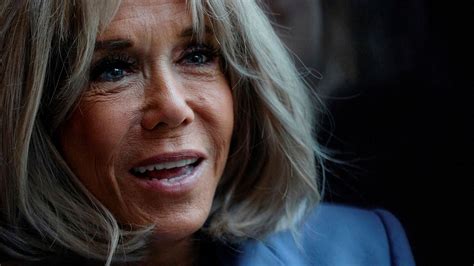
A resurfaced video featuring French President Emmanuel Macron and his wife, Brigitte, has reignited unsubstantiated rumors of an alleged affair between the president and his former bodyguard, Alexandre Benalla, despite repeated denials and a defamation lawsuit filed years prior. The renewed speculation, fueled by social media and fringe online platforms, centers on the Macrons’ public appearances and perceived body language, prompting widespread discussion and scrutiny of their relationship.
PARIS – An old video clip is circulating online, breathing new life into unfounded allegations of an affair between French President Emmanuel Macron and Alexandre Benalla, his former security aide. The resurgence of these rumors, initially surfacing years ago, is taking place amidst a landscape of heightened political tensions and increased scrutiny of public figures. Despite past denials from the presidential couple and a legal attempt to silence the original purveyors of the claims, the whispers persist, amplified by social media algorithms and fringe online communities.
The video in question, the specific content of which remains largely unspecified in the renewed reporting, is being dissected and reinterpreted by online users, who claim to find evidence of a strained relationship between President Macron and his wife, Brigitte. These claims are largely based on conjecture and subjective interpretations of their interactions during public events. The renewed interest underscores the challenges faced by public figures in combating misinformation and conspiracy theories in the digital age.
The initial rumors of an affair between Macron and Benalla first emerged in 2018, following the controversy surrounding Benalla’s violent conduct during a May Day demonstration in Paris. Benalla was filmed assaulting protesters, an incident that led to his dismissal from the president’s security detail and triggered a political scandal that plagued Macron’s administration.
Following Benalla’s dismissal, claims linking Macron romantically to his former bodyguard began circulating online, propagated by fringe websites and social media accounts. These rumors were widely dismissed as baseless and politically motivated attempts to undermine the president’s credibility. The Macrons themselves vehemently denied the allegations, and Brigitte Macron initiated legal action against individuals who were actively spreading the false information.
In 2019, Brigitte Macron filed a lawsuit against two women who had disseminated the rumor on social media, accusing them of defamation. The legal action underscored the seriousness with which the Macrons regarded the allegations and their determination to protect their privacy and reputation. However, despite the lawsuit and the widespread condemnation of the rumors, they continue to resurface periodically, fueled by online echo chambers and partisan agendas.
The resurgence of these rumors can be attributed to several factors, including the increasingly polarized political climate in France, the proliferation of misinformation online, and the public’s fascination with the personal lives of political leaders. The internet’s ability to amplify and disseminate information, regardless of its veracity, makes it difficult to completely suppress false narratives, even when they have been debunked or legally challenged.
Furthermore, the rumors tap into pre-existing societal anxieties and prejudices, particularly those related to age differences in relationships. Brigitte Macron is 24 years older than her husband, a fact that has been consistently highlighted by critics and used to fuel speculation about the nature of their relationship. The rumors also play on stereotypes and tropes about powerful men and their relationships with their subordinates, contributing to a broader narrative of distrust and cynicism towards political elites.
The current resurgence of the Macron-Benalla rumors highlights the persistent challenges of combating disinformation and protecting public figures from malicious attacks on their personal lives. The incident underscores the need for greater media literacy and critical thinking skills among the public, as well as more effective strategies for addressing the spread of false information online. It also raises questions about the ethical responsibilities of social media platforms in preventing the dissemination of harmful content and protecting individuals from online harassment and defamation.
The allegations also resurface at a politically sensitive time for Macron. His second term has been marked by widespread protests and social unrest over controversial pension reforms. His approval ratings have suffered as a result, making him more vulnerable to criticism and attacks from political opponents. The timing of the rumor resurgence suggests that it may be part of a coordinated effort to further undermine his credibility and weaken his political standing.
Political analysts suggest that the rumors are being strategically amplified by Macron’s detractors to distract from policy debates and undermine his public image. By focusing on his personal life, opponents hope to delegitimize his presidency and erode his support base. This tactic is particularly effective in a media landscape where sensationalism often trumps substantive reporting.
The French media’s response to the resurfaced rumors has been relatively muted, with most mainstream outlets refraining from amplifying the allegations. However, the rumors have gained traction on social media platforms and in certain segments of the alternative media, where they are being actively promoted and discussed. This discrepancy highlights the growing divide between traditional media outlets and online platforms in shaping public opinion.
The incident serves as a reminder of the power of social media to shape public discourse and influence political outcomes. While social media can be a valuable tool for disseminating information and engaging in democratic debate, it can also be used to spread misinformation, incite hatred, and undermine public trust in institutions. The challenge for policymakers and media organizations is to find ways to harness the benefits of social media while mitigating its risks.
The Macron-Benalla rumors also raise broader questions about the role of privacy in the digital age. Public figures, like all individuals, have a right to privacy, and their personal lives should not be subject to unwarranted scrutiny or malicious attacks. However, the internet has made it increasingly difficult to maintain privacy, as personal information can be easily shared and disseminated online. This creates a tension between the public’s right to know and the individual’s right to privacy, a tension that is likely to become increasingly acute in the years to come.
The story also touches upon the evolving nature of political communication. In the past, political leaders could rely on traditional media outlets to filter information and shape public perceptions. However, the rise of social media has disrupted this model, allowing politicians to communicate directly with the public and bypass traditional media gatekeepers. While this can be empowering, it also creates opportunities for misinformation and manipulation.
In conclusion, the resurfacing of the Macron-Benalla rumors underscores the challenges of combating disinformation in the digital age and protecting public figures from malicious attacks on their personal lives. The incident highlights the need for greater media literacy, critical thinking skills, and ethical responsibility in the online environment. It also raises broader questions about the role of privacy, political communication, and the responsibility of social media platforms in shaping public discourse. The persistence of these rumors, despite repeated denials and legal action, serves as a stark reminder of the power of misinformation to undermine public trust and distort political realities. Ultimately, the situation emphasizes the need for continuous vigilance and proactive measures to address the spread of false narratives and protect the integrity of democratic institutions. The incident underscores the increasing weaponization of rumors and misinformation in the political sphere, a trend that poses a significant threat to democratic processes and social cohesion.
The impact extends beyond Macron himself. It affects the perception of French political stability and leadership on the international stage, especially at a time when France plays a crucial role in European and global affairs. The constant barrage of unsubstantiated allegations can erode public confidence in the government and distract from pressing policy issues. It also sets a dangerous precedent where personal attacks and fabricated stories become acceptable tools in political warfare.
The situation calls for a multi-faceted approach to combat disinformation, involving governments, media organizations, educational institutions, and social media platforms. This includes promoting media literacy and critical thinking skills among the public, strengthening fact-checking initiatives, and holding social media platforms accountable for the content they host. Furthermore, it requires a greater emphasis on ethical journalism and responsible reporting, with media organizations prioritizing accuracy and objectivity over sensationalism and clickbait.
The legal implications of spreading such rumors are also significant. While Brigitte Macron’s defamation lawsuit aimed to deter further dissemination, the persistence of the allegations demonstrates the limitations of legal action in the face of widespread online activity. The anonymity and reach of the internet make it difficult to identify and prosecute all those involved in spreading false information. However, it is important to continue to pursue legal remedies against those who knowingly and maliciously spread harmful rumors, as a deterrent to others.
The Macron case serves as a case study for other political leaders and public figures who are increasingly vulnerable to online attacks and misinformation campaigns. It highlights the importance of having a proactive communication strategy to address false allegations and counter negative narratives. This includes engaging with the public directly through social media, providing transparent information about their activities, and challenging false claims aggressively.
Moreover, the incident underscores the need for greater awareness and sensitivity among the public regarding the impact of online rumors and misinformation. Individuals should be encouraged to think critically about the information they encounter online, to verify its accuracy, and to refrain from sharing content that is unverified or potentially harmful. Social media platforms also have a responsibility to promote responsible online behavior and to discourage the spread of misinformation.
In the long term, addressing the root causes of disinformation requires a broader societal effort to promote trust in institutions, strengthen social cohesion, and combat polarization. This includes investing in education, promoting civic engagement, and fostering dialogue across different perspectives. It also requires addressing the underlying economic and social inequalities that can fuel resentment and distrust.
The controversy underscores the importance of understanding the dynamics of online information ecosystems. Misinformation often spreads through networks of interconnected accounts and websites, creating echo chambers where false information is amplified and reinforced. Understanding these networks is crucial for developing effective strategies to counter disinformation. This requires sophisticated data analysis tools and expertise in network analysis.
The role of foreign actors in spreading disinformation should also be considered. There is evidence that foreign governments and organizations have engaged in deliberate campaigns to spread false information and sow discord in other countries. These campaigns often target political leaders and institutions, with the aim of undermining public trust and destabilizing democratic processes. Countering foreign interference requires a coordinated effort by governments, intelligence agencies, and social media platforms.
The Macron-Benalla rumors also highlight the importance of distinguishing between legitimate criticism and malicious disinformation. In a democratic society, it is essential to allow for open debate and criticism of political leaders and policies. However, this criticism should be based on facts and evidence, not on false rumors and fabricated stories. The line between legitimate criticism and disinformation can be blurry, but it is important to draw this distinction in order to protect democratic values and prevent the spread of harmful misinformation.
The situation also illustrates the psychological factors that contribute to the spread of misinformation. People are more likely to believe information that confirms their existing beliefs or biases, even if that information is false. This is known as confirmation bias. People are also more likely to share information that evokes strong emotions, such as anger, fear, or outrage. Understanding these psychological factors is crucial for developing effective strategies to counter misinformation.
The resurgence of these rumors poses a significant challenge to the Macrons and to French society as a whole. It highlights the need for continued vigilance and proactive measures to address the spread of disinformation and protect the integrity of democratic institutions. The incident underscores the importance of media literacy, critical thinking, ethical journalism, and responsible online behavior. It also calls for a broader societal effort to promote trust, social cohesion, and democratic values. Only through a concerted and multi-faceted approach can we effectively combat the spread of misinformation and protect ourselves from its harmful consequences. The incident serves as a crucial reminder that the fight against disinformation is an ongoing battle that requires constant vigilance and adaptation.
Frequently Asked Questions (FAQ):
1. What are the rumors circulating about President Macron and Alexandre Benalla?
The rumors allege an affair between French President Emmanuel Macron and his former bodyguard, Alexandre Benalla. These claims, which initially surfaced in 2018, are unsubstantiated and have been repeatedly denied by the Macrons. The rumors are being fueled by the resurfacing of an old video and online speculation.
2. What is the origin of these rumors and when did they first emerge?
The rumors originated in 2018 following the controversy surrounding Alexandre Benalla’s violent conduct during a May Day demonstration in Paris. After Benalla was dismissed, claims linking Macron romantically to his former bodyguard began circulating online.
3. Has Brigitte Macron taken any legal action regarding these rumors?
Yes, in 2019, Brigitte Macron filed a lawsuit against two women who had disseminated the rumor on social media, accusing them of defamation. This legal action underscores the seriousness with which the Macrons regard the allegations.
4. Why are these rumors resurfacing now?
The rumors are resurfacing due to a combination of factors, including the polarized political climate in France, the proliferation of misinformation online, the public’s fascination with the personal lives of political leaders, and the strategic amplification of the rumors by Macron’s detractors seeking to undermine his credibility.
5. What impact do these rumors have on President Macron and French politics?
The rumors can erode public confidence in the government and distract from pressing policy issues. They also serve as a case study for the challenges of combating disinformation and protecting public figures from malicious attacks on their personal lives. The situation also affects the perception of French political stability and leadership on the international stage.









